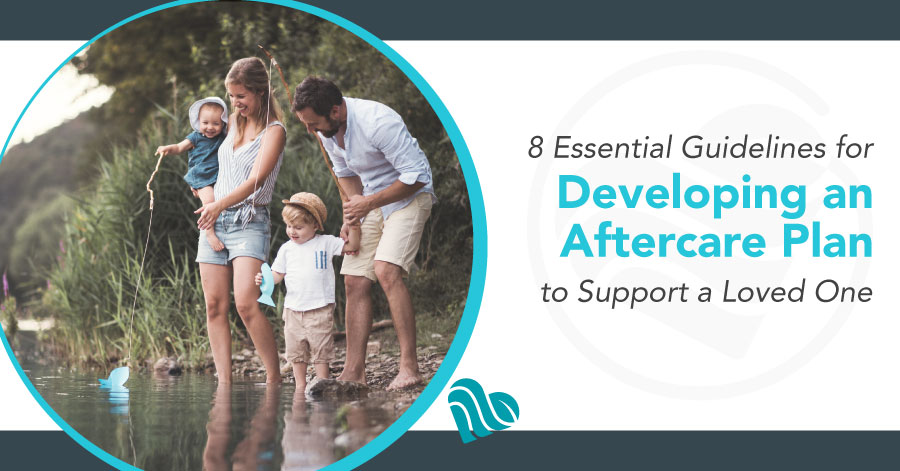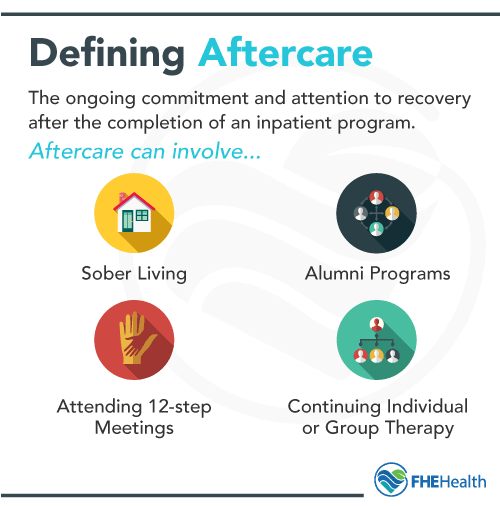
After watching someone you love struggle with a substance abuse disorder for weeks, months or even years, the successful completion of an addiction treatment program may feel like the weight has been lifted off of your shoulders. And while it’s true that rehab is a vital step in the recovery process, it’s not the end of the road — it’s just the beginning.
Addiction is a lifelong disease, and continuing in recovery requires the right perspective when initial treatment is complete. In virtually all cases, this means the right approach to post-rehab care to avoid joining the 40% to 60% of addicts who eventually relapse. For family members who live with or around those working through addiction, it’s important to understand the key essentials in an aftercare plan.
What Is Aftercare?

Aftercare refers to an ongoing commitment and attention to recovery after the completion of inpatient rehabilitation. This process can involve any number of things, from 12-step programs to lifestyle modifications, depending on the unique needs of the individual in question.
Unlike residential treatment programs, aftercare isn’t necessarily something best-handled solo. In fact, family support in aftercare can make a significant difference in success rates, contributing to ongoing progress. With support and guidance from family and friends, relapse rates can reduce significantly.
Eight Essential Guidelines for Developing an Aftercare Program
Providing support as family members of someone in addiction recovery can be critical to a successful outcome, but a solid structure to this support is very important. These are the eight essential guidelines for developing an aftercare program.

Provide Structure and Supervision
Sobriety is never easy, but having a structure makes a difference. Those who just finished residential programs have only known abstinence from drugs or alcohol within a structured environment, so continued oversight in a controlled atmosphere can ease the assimilation back into normal life. Too much freedom too soon can increase the likelihood of relapse, so maintaining ongoing attention is a necessary step. For families living with someone in recovery, rules, like curfews and bed checks, along with regular supervision, are very important.
Rewards and Consequences
In recovery, rewards and consequences can be used to guide behavior. For example, continued sobriety and achieving other benchmarks, like holding a steady job or attending 12-step meetings, can be rewarded with further privileges, like regaining driving privileges, while failing to go to meetings or not making responsible life choices can lead to consequences. This is not intended to be a punishment, per se, but rather a way to communicate that falling back into old habits isn’t acceptable.
Random Testing
No one enjoys drug tests, but for those in recovery, regular testing can be a good way to ensure problems aren’t on the horizon. This generally isn’t on the family to handle, as doing so can cause relationship issues, but rather is managed through an outpatient program or halfway house. For alcoholics, breathalyzing at frequent intervals is recommended.
12-Step Program Attendance
12-step programs can be a large benefit to those in recovery. Offering continued exposure within the recovery community while providing a consistent obligation related to sobriety, 12-step programs can serve many communities working through addiction. While most 12-step programs are addiction-specific and are designed for those working through addiction, meetings are open to the public, and family members are encouraged to attend meetings to best provide support.
Highlight Mentors and Role Models in Recovery
At times, recovery can feel impossible. The process of abstaining from the desired substance and relearning how to live is never an easy road, and even the strongest participants feel like giving up from time to time. As such, finding solid role models can be a benefit for those in recovery. This can be people in media who have struggled with getting sober as well as members of a direct recovery community, like AA sponsors. These individuals can offer a wealth of experience and support in tough times, showing those new to sobriety that, yes, it is possible to create healthy habits that last a lifetime.
Relationships with sponsors should be encouraged to the largest extent possible; these bonds can be instrumental in guiding a successful recovery.
Encourage Modified Lifestyle Behaviors
One of the largest challenges in returning from inpatient treatment programs as well as intensive outpatient programs involves the transition back into normal life. In some ways, quitting drugs or alcohol creates a loss of identity. Without parties to go to or drugs to do, some newly sober individuals don’t know how to live a normal life. This is to be expected after a prolonged period of abuse, but properly processing this isn’t always easy.
To best support this thought process, family members need to notice these moments and be actively involved in encouraging healthy habits versus toxic ones. On weekend nights, for example, it’s important to provide healthier alternatives, like game nights or family dinners.
Management of Relapse Signs and Symptoms
Unfortunately, relapse is a reality for many individuals recovering from drugs and alcohol. For friends and family members of recovering addicts, understanding this and looking for signs can be a key part of encouraging ongoing recovery. Instead of assuming everything is always okay, families should be cognizant of the signs of relapse and be proactive when even the slightest activity seems unusual. Confronting components of active addiction is imperative, so the sooner family members see signs of risks and bring them up, the easier it is to contain a potential problem.
Dedication to Continuing Care
Addiction never goes away. The desire to use may reduce in time, but addiction is a disease that lasts a lifetime. As a family, it’s critical to understand this and to make arrangements accordingly. A concrete plan to approach addiction, like 12-step program attendance and steady employment, can keep those in recovery on the right track, ensuring the right approach to getting well. As such, it’s very important for families of addicts to create a plan and stick to it: today, tomorrow and years down the road. There’s no way to absolutely prevent future use, but the more concrete your solutions, the more likely it is that you and your loved one will ultimately succeed.
Addiction is never easy, and rehabilitation is only the first step. For families of individuals leaving a dedicated treatment program, the right aftercare plan can ensure that recovery is a permanent state, not a temporary place between moments of use. With these eight essential steps, it’s possible to do everything necessary to prevent relapse and encourage a healthy approach to sobriety.
If your loved one is facing a substance use disorder, getting help is imperative. Contact FHE Health today to learn more about our comprehensive step-down addiction treatment programs.






